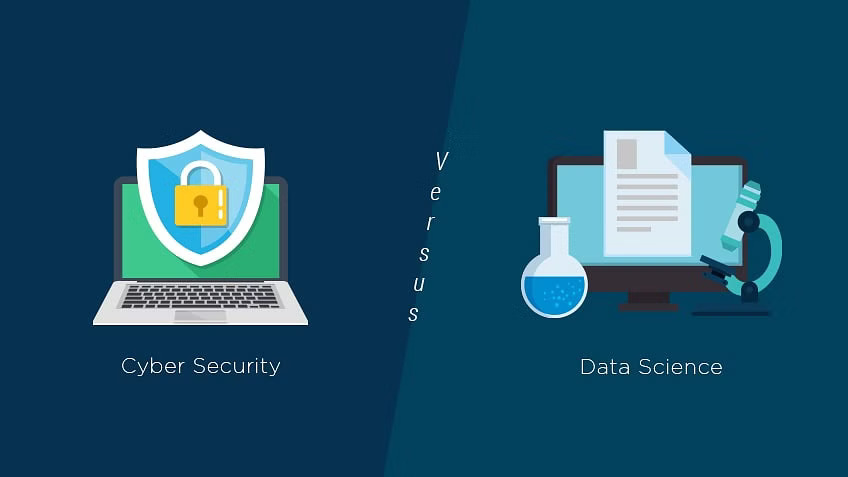In the rapidly evolving digital landscape, cybersecurity and data science stand at the forefront of technology and innovation. While distinct, these disciplines play a critical role in understanding and protecting digital information. In this blog, we delve into the realms of cybersecurity and data science, exploring their interrelation, differences, uses, and career opportunities, aiming to provide clarity to those contemplating a path in either area.
For those interested in a cybersecurity career, taking an online cybersecurity program is a great way to gain the most in-demand skills for success.
So, What is Cybersecurity?
Conversely, cybersecurity refers to protecting systems, networks, and programs from digital attacks. These cyberattacks usually aim to access, change, or destroy sensitive information, extort money from users, or interrupt normal business processes. Implementing effective cybersecurity measures is particularly challenging today because there are more devices than people, and attackers are becoming more innovative.
Cybersecurity strategies involve the application of various technologies, processes, and controls designed to protect systems, networks, and data from cyber threats. This field requires a deep understanding of the potential risks and the latest security practices and technologies designed to mitigate these risks.
Also Read: Cybersecurity vs. Software Engineering: Which Career Path is Right for You?
What Is Data Science?
Data science is an interdisciplinary field that uses scientific methods, processes, algorithms, and systems to extract knowledge and insights from structured and unstructured data. A data science career involves using statistics, machine learning, and analytics to analyze and interpret complex data to aid decision-making. The process typically involves data preparation, analysis, visualization, and the creation of predictive models that can forecast trends and patterns.
Data science applications are vast, impacting sectors such as healthcare, finance, marketing, and beyond. It enables companies to optimize operations, enhance customer engagement, predict market trends, and improve business outcomes.
How Cybersecurity and Data Science Are Related?
Though cybersecurity and data science may initially appear as separate disciplines, they are deeply interwoven in many respects. Data science plays a significant role in enhancing cybersecurity efforts by providing analytical insights that can predict potential threats and highlight vulnerabilities. For example, machine learning models can analyze trends in data breach incidents and help organizations implement proactive measures.
Conversely, cybersecurity ensures the protection of data used for data science applications. Secure data environments are crucial for data scientists to perform their analyses without the risk of data breaches or leaks. Thus, integrating cybersecurity practices into data science workflows is essential for the integrity and confidentiality of data analysis.
Also Read: What is a Security Operations Center?
Cybersecurity vs. Data Science: How Are They Different?
While cybersecurity protects information and systems from cyber threats, data science involves processing and analyzing data to derive actionable insights. Cybersecurity is inherently defensive, aiming to prevent, detect, and respond to attacks, whereas data science is more about exploration and discovery, seeking patterns, predictions, and insights from data.
Cybersecurity Uses and Importance
The uses of cybersecurity are vast and critical in our digital age:
- Protecting business assets: Cybersecurity measures protect physical and intellectual property from theft, damage, and disruption.
- Maintaining privacy: Ensuring the confidentiality of personal and business information is vital to maintaining privacy and compliance with laws.
- Supporting a safe transaction environment: As financial transactions continue moving online, cybersecurity becomes essential in preventing fraud and theft.
Data Science Uses and Importance
Data science has its own broad and impactful applications:
- Business intelligence: Data science helps businesses make more informed decisions by providing crucial insights about their operations, customers, and markets.
- Innovative products and services: Through predictive analytics and machine learning, businesses can create innovative solutions tailored to their customers’ needs and behaviors.
- Efficiency improvements: Automation and algorithms developed through data science can significantly improve operational efficiency.
Also Read: What is Cyber Hygiene? Meeting Cybercriminals on the Front Lines
Career Paths: Cybersecurity vs. Data Science
Cybersecurity careers include Security Analyst, Security Engineer, Chief Information Security Officer (CISO), and Cybersecurity Consultant roles. These roles typically require network security, information assurance, and security protocol design skills.
Data science careers include Data Scientist, Data Analyst, Machine Learning Engineer, and Data Science Manager. Skills frequently sought in this field are statistical analysis, machine learning, data visualization, and programming expertise in Python or R.
Cybersecurity vs. Data Science: Salary Expectations
Salaries in both fields are promising due to high demand. According to Glassdoor, US cybersecurity professionals can expect to earn an average annual salary of $133K, and US data scientists can earn an average annual salary of $155K. Leadership and specialized roles in both fields can command higher salaries and additional benefits.
The Demand for Talent in Both Fields is Enormous
The choice between a cybersecurity career and a data science career largely depends on individual interests and strengths. Cybersecurity offers a dynamic environment focused on protection and crisis management, while data science revolves around analysis, predictions, and driving business intelligence. Both fields offer promising careers and are crucial in shaping the future of technology and digital security. As the digital landscape evolves, cybersecurity and data science will only grow, making them essential pillars of modern business and technology strategies.
There is a high demand for talent in both fields. As these technologies change rapidly, staying updated with the latest tools and techniques is essential. Check out this online cybersecurity bootcamp if this is the path you want to pursue.
Also Read: Cybersecurity Basics: What is Threat Modeling?
FAQs
1. What is better, cybersecurity or data science?
The choice between a cybersecurity career and a data science career depends on your interests and goals. If you are passionate about protecting data and thwarting cyber threats, cybersecurity may be the better choice. Data science could be more suitable if you prefer analyzing data and extracting meaningful insights to influence decisions and strategies. Both fields are equally important and offer robust career opportunities.
2. Can a data scientist get into a cybersecurity career?
Yes, a data scientist can transition into cybersecurity. Many skills in data science, such as analytical thinking, problem-solving, and proficiency with data handling and software tools, are also valuable in cybersecurity. Data scientists with an interest in security can enhance their qualifications by learning specific cybersecurity concepts and tools, which can open up roles in areas like security analytics and threat intelligence.
3. Is cybersecurity harder than data science?
Comparing the difficulty of cybersecurity and data science is subjective and depends on your natural aptitudes and professional background. Both fields require a deep understanding of complex systems and continuous learning to keep up with new technologies and methods. Cybersecurity involves understanding and defending against evolving threats, which can be challenging. Data science careers require strong statistical and programming skills to analyze and derive insights from large data sets, which also presents significant challenges.
You might also like to read:
Technology at Work: Data Science in Finance
What is a Data Warehouse? Characteristics, Architecture, Types, and Benefits
10 Top Data Collection Tools For Data Science Professionals
What Are the Components of Data Science?
Is Data Science Hard? What Does It Take to Get Into the Field?






